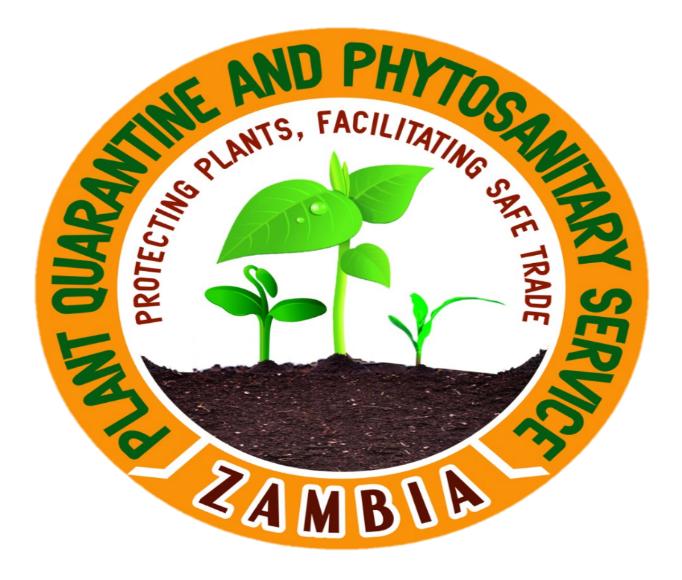Ask And Learn.
What to know about PHYTOSANITARY SERVICES and their importance to the AGRICULTURE SECTOR.
- Issuance of Phytosanitary Certificatees (PC) for export of plants, plant products and other regulated articles;
- Issuance of Plant Import Permits (PIPs) for importation of plants, plant products and other regulated articles;
- Issuance of Transit Permits for consignments passing through Zambia;
- Laboratory Diagnostics for identification of plant pest and diseases;
- Training in Fumigation and Wood Packaging Material Treatment;
- Fumigation Registration, Wood Treatment Facility Registration, Plant Nursery Registration, Processing Facilities and Tobacco Storage Premises Registration;
- Pest Risk Analysis on plant, plant plant products, plant pests and other regulated articles for generation of scientifically justified import requirements; and
- Advisory on plant health matters and trade requirements to farmers, traders, clearing agents, travellers and other stakeholders.
Getting a Phytosanitary Certificate process started, the Client is supposed to acquire a Plant Import Permit from the Importing Country. For an export, an inspection of the commodity has to be done with an inspection report given by an Inspector. Afterwards they can then visit our website and apply. If one does not have an account on our system, they can create one, get it activated and then apply.
To Book for an inspection, Call 0770446402. Later on Visit any of our offices and make payments with our accounts offices.
Visit: https://www.zesw.gov.zm/zesw/
Use the same url to register online and request for activation by sending your:
1. Company name
2. Tpin
3. Email address used to open the account
to the following emails:
cust-helpdesk@zra.org.zm and copy: kalabab@zra.org.zm
You can also contact Ms Bupalo +260 97 8113014 incase of registration and account activation challenges.
The CONSIGNEE NAME, TPIN, ADDRESS and OFFICE OF PAYMENT are already in the system, so there is no need for one to fill these entries. On the PRODUCT NAME, one has to describe in which group his/her commodity is in. The HS CODE is dependent on the PRODUCT NAME. After all entries have been filled in, one can then click on ADD PRODUCT which will show a rectangular box with all the details in it. Uderneath the rectangular Box, there will be an UPLOADING section were one can upload any document. On the bottom, click on PREVIEW to review all the information that has been entered. After counter checking, the 'SUBMIT' button can be clicked to submit the Application.
An application is fully processed within 48 hours.
- Registration, Activation, Creation of an Application and Submission of an Application by a client.
- Document Check by the Authorised officers under PQPS.
- Approval by Authorised officers under PQPS.
- Document Check by the Authorised officers under AGRIBUSINESS
- Approval by the Authorised officers under AGRIBUSINESS
- Payment by Client after downloading the invoice.
- Downloading Phytosanitary Certificate and Permit after payment.
Payment is made right after the Application has been approved by AGRIBUSINESS Final Approval. An invoice is generated in the OUTPUT. So, the client downloads the invoice from the OUTPUT and takes it to AGRIBUSINESS together with the Total amount on the Invoice.
After the client downloads the Invoice from the OUTPUT; The invoice together with the amount indicated on the invoice can either be taken to ABM or PQPS office for facilitation of payment by use of POS machine or Physical Bank Deposit.
These letters stand for; PLANT QUARANTINE AND PHYTOSANITARY SERVICE. This is the National Plant Protection Organisation of Zambia.
These letters stand for; ZAMBIA ELECTRONIC SINGLE WINDOW. This is a platform being used in Zambia to collect trade Permits for plant, plant products and regulated articles.
General and Fumigation Inspections are done on Mondays, Wednesdays and Fridays. But then, on Tuesdays and Thursdays there are nursery inspections done.
One has to either visit one of our stations and swipe or collect our account details and deposit with the bank.
Products meant for domestic usage or consumption are exempted from paying inspection fee and usually, these products are in small quantities.
1.The client should lodge an application online and attach relevant documents
2. The Client then waits for processing of the application(s)
3. When invoiced, the client is allowed to pay based on invoice figure(s) into the Government Transit account either by use of POS machine or bank deposit. The client should take note that payment for ABM permit(s) and PQPS permit(s) should be done at once as a whole figure, separated by codes if depositing in the bank using a Government Transit account deposit slip. If using a POS machine, either a PQPS machine or ABM can be used to facilitate for payment of the block figure as appearing on invoice. 4. The client must Scan and send deposit slip to The Department of Finance on the following email addresses: mutintambozi@yahoo.com, lutekumwenda1970@gmail.com, pezomayondi@gmail.com, for receipting on ZESW before permits are issued.
6. The client has to make sure he/she attaches the copy of deposit slip to copy of Phytosanitary certificate retained by the office. For PIP and Transit Permit, file deposit slips accordingly.
7. Issue the permit(s) (Phytosanitary certificates). For other permits, client waits to access them on the system once done.
mutintambozi@yahoo.com, lutekumwenda1970@gmail.com, pezomayondi@gmail.com
Problems, Questions, Suggestions, Concerns, Complaints... Contact Us;
HQ Address:
Call Us On:
0968-280140
0977-617021
